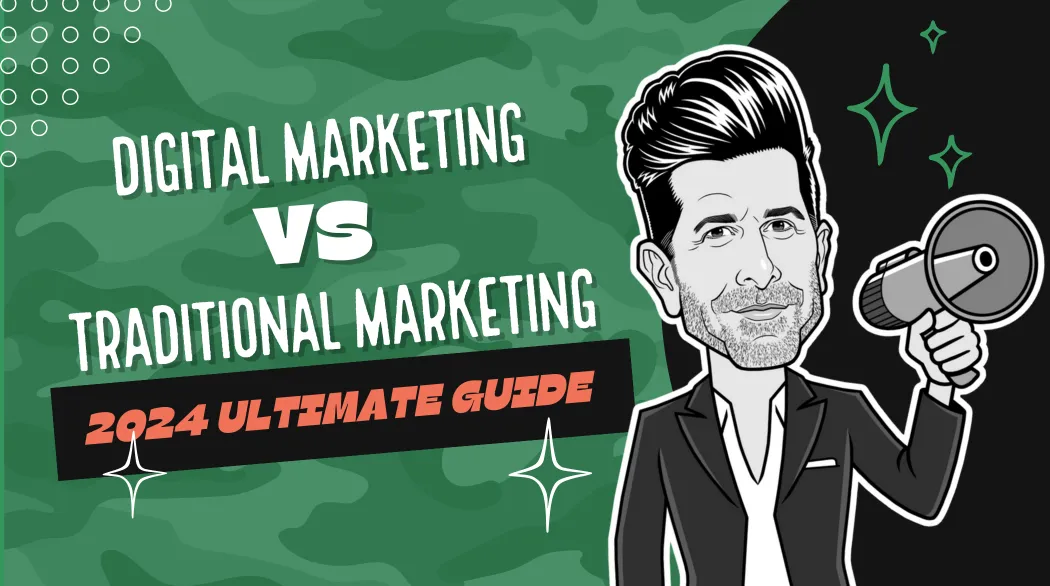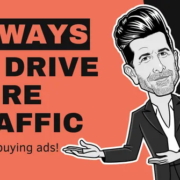Digital Marketing vs Traditional Marketing: Comprehensive Comparison for 2024

Understanding the dynamics of the ever-changing marketing landscape is a critical factor for any business aiming to stay ahead of the curve. As we anticipate the trends of 2024, it becomes increasingly important to delve into a comprehensive comparison of digital and traditional marketing.
This guide will dissect their strengths and weaknesses, providing valuable insights to help shape your business’s marketing strategy.
Decoding the Basics: Digital and Traditional Marketing

Before we embark on our detailed comparison, let’s first establish a comprehensive understanding of what we mean by digital and traditional marketing.
Digital Marketing Revolution
It refers to all marketing efforts carried out using the internet or electronic devices. Businesses use a variety of digital channels, including search engines, websites, social media, and email, to connect with both prospective and current customers.
Leading the charge in this digital revolution are digital marketing agencies and SEO companies, which specialize in navigating the intricate world of online marketing. Also, the rise of smartphones and widespread internet access has made marketing digitally an indispensable tool for businesses.
With people spending a significant portion of their day online, online marketing offers a unique opportunity to reach customers directly in their own digital spaces, thus personalizing the consumer experience.
Persistence of Traditional Marketing
Traditional marketing encompasses all the marketing methods that pre-date the internet. This includes time-tested approaches like print advertising, direct mail, TV and radio broadcasts, telephonic marketing, and outdoor advertising like billboards.
Despite the shift towards digital, old marketing techniques remain effective for reaching certain demographics and for specific types of campaigns. These methods have stood the test of time and offer significant benefits.
They provide tangible materials, create lasting impressions, and can reach audiences without internet access. These methods also offer high levels of credibility, given their long-standing use in the business world.
The Showdown: Digital Marketing vs Traditional Marketing

With a clear understanding of both terms, let’s pit them against each other across several critical parameters.
Audience Reach and Targeting Precision
Traditional techniques tend to have a broad reach, but they often lack precision when targeting specific audience segments. For example, a billboard on a busy road will be seen by a wide array of people, but there’s no guarantee that these people will fall within your target demographic.
In contrast, digital techniques allow businesses to target specific demographics with a high degree of accuracy. A digital marketing agency can help design and implement strategies that engage your ideal customers in their preferred online spaces. You can target audiences based on age, location, interests, browsing behavior, and more.
Cost Effectiveness and Return on Investment (ROI)
Traditional methods, such as TV commercials or billboards, can be quite costly. Producing and distributing physical marketing materials or buying media space can eat into your budget quickly. Furthermore, measuring the success of these campaigns can be challenging, making it difficult to calculate an accurate ROI.
On the other hand, digital methods are typically more affordable and offer a better ROI. Digital campaigns can be run at various budget levels, making them accessible to businesses of all sizes. Plus, with advanced analytics tools, you can track the performance of your campaigns in real time.
Engagement Opportunities and Customer Interaction
One area where online marketing truly shines is its ability to facilitate direct customer engagement and interaction. Businesses can have two-way conversations with their customers through channels like social media, blogs, and email marketing. This helps foster relationships and provides valuable feedback and insights that can be used to improve products and services.
On the other hand, traditional advertising, while effective for disseminating information, generally lacks this level of interactivity. The communication is often one-way, making it difficult for businesses to gauge the audience’s response immediately.
Speed, Flexibility, and Adaptability
In our fast-paced world, the ability to quickly adapt marketing strategies is a significant advantage. Online advertising offers this flexibility. You can launch campaigns rapidly, test different approaches, and adjust your strategy on the fly based on real-time results.
In contrast, traditional advertising campaigns require more planning and lead time to implement and don’t offer the same level of adaptability. Once a billboard is up or a print ad is published, making changes can be costly and time-consuming.
The Evolving Role of Marketing Agencies in 2024

As we approach 2024, the role of marketing agencies will continue to evolve. Whether your focus is on digital or traditional advertising or a combination of both, these agencies will play a pivotal role in shaping and executing your strategy.
Expanding Influence of Marketing Agencies and SEO Companies
Digital marketing agencies offer various services, from search engine optimization (SEO) to social media management. These agencies stay abreast of the latest digital trends and technologies, ensuring their clients’ strategies remain relevant and effective.
SEO companies, in particular, play a crucial role in online marketing. They optimize websites to rank higher in search engine results, increasing online visibility and attracting organic traffic. As search engines continue to be a primary way people find information online, SEO remains a key component of any successful marketing strategy.
Sustained Relevance of Traditional Advertising Agencies
Despite the shift towards digital, traditional advertising agencies continue to play a vital role in the marketing landscape. These agencies specialize in creating compelling advertisements and placing them across various media channels to reach a wide audience.
Traditional advertising agencies bring extensive experience and creativity to the table. They can craft powerful messages and visuals that resonate with audiences and leave lasting impressions. While digital grows, there will still be a need for these traditional skills.
Emergence of Hybrid Marketing Agencies
As the boundaries between digital and traditional advertising blur, we anticipate a rise in hybrid marketing agencies offering a mix of both. These agencies can provide a holistic approach, integrating online and offline strategies to create comprehensive marketing campaigns.
Hybrid agencies offer the best of both worlds, combining the wide reach of old marketing techniques with the precision and interactivity of digital. As businesses continue to navigate the increasingly complex marketing landscape, these all-in-one agencies will become invaluable partners.
The Future Balance Between Digital and Traditional Marketing
In conclusion, both digital and traditional advertising have unique strengths and can be effective depending on the specific needs of your business. While digital offers precision targeting, cost-effectiveness, high engagement, and flexibility, traditional can provide a wide reach and create high-impact visibility.
Choosing between the two shouldn’t be about picking one over the other but about finding the right balance. A reputable marketing or advertising agency can assist in making the best decision for your business in 2024. The future of marketing lies in an omnichannel strategy that leverages the distinctive capabilities of both.
As we look ahead, one thing remains constant: the need to connect with customers in meaningful ways. Both marketing techniques offer different avenues to achieve this goal. The most effective marketing strategies will be those that best understand and cater to the evolving needs and behaviors of consumers.
As we move into the future, the successful marketer will be one who can seamlessly blend the old with the new to create compelling brand stories and customer experiences.
Frequently Asked Questions (FAQs)
What is the main difference between digital and traditional marketing?
The main difference lies in the medium through which an audience encounters a marketing message. While traditional one uses methods like print ads, billboards, and television spots; digital happens online and includes strategies such as social media campaigns, website content, and email marketing.
What is the main difference between digital and traditional marketing?
In many cases, digital marketing can be more cost-effective than traditional. Digital campaigns can be tailored to fit any budget, and you only pay for engagements or clicks. However, costs can vary depending on the strategy and scale of your campaign.
How can I measure the success of my digital marketing efforts?
Online marketing offers multiple ways to measure success through analytics. You can track website traffic, engagement rates, click-through rates, conversions, and more. These metrics provide valuable insights into your campaign’s performance and your audience’s behavior.
Can traditional marketing still be effective in 2024?
Yes, it can still be effective, especially when used in conjunction with digital. Traditional methods, like TV ads or billboards, can reach a broad audience and create strong brand impressions.
How can a hybrid marketing agency benefit my business?
A hybrid marketing agency can offer the best of both worlds by integrating online and offline strategies. This allows for a more comprehensive approach to your marketing efforts, ensuring that you reach your audience wherever they are.




Leave a Reply
Want to join the discussion?Feel free to contribute!